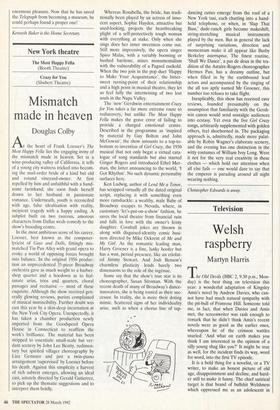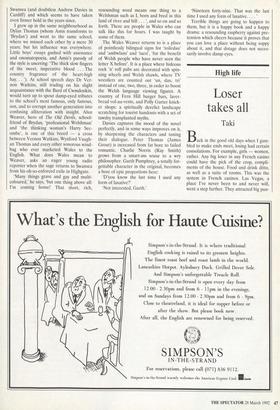Television
Welsh raspberry
Martyn Harris
The Old Devils (BBC 2, 9.30 p.m., Mon- day) is the best thing on television this year: a wonderful adaptation of Kingsley Amis's novel by Andrew Davies, who can- not have had much natural sympathy with the pit-bull of Primrose Hill. Someone told me, in fact, that when Davies and Amis met, the screenwriter was rash enough to remark that he didn't think Amis's recent novels were as good as the earlier ones, whereupon he of the crimson wattles snarled: 'And what on earth makes you think I am interested in the opinion of a silly young shag like you?' It might be true as well, for the incident finds its way, word for word, into the first TV episode.
It is a bold thing for a novelist, or a TV writer, to make an honest picture of old age, disappointment and decline, and hard- er still to make it funny. The chief satirical target is that brand of bullshit Welshness which oppressed me as an adolescent in Swansea (and doubtless Andrew Davies in Cardiff) and which seems to have taken even firmer hold in the years since.
I grew up in the same neighbourhood as Dylan Thomas (whom Amis transforms to 'Brydan') and went to the same school, where we missed each other by a mere 30 years; but his influence was everywhere. Little boys' essays gushed with assonance and onomatopoeia, and Amis's parody of the style is unerring: 'The thick slow fingers of the sweet, imperative blood . .. The country fragrance of the heart-high hay. . . '). At school speech days Dr Ver- non Watkins, still trading on his slight acquaintance with the Bard of Cwmdonkin, would turn up to spout damp-eyed tributes to the school's most famous, only famous, son, and to corrupt another generation into confusing alliteration with insight. Alun Weaver, hero of The Old Devils, school- friend of Brydan, 'professional Welshman' and 'the thinking woman's Harry Sec- ombe', is one of this breed — a cross between Vernon Watkins, Wynford Vaugh- an Thomas and every other sonorous wind- bag who ever marketed Wales to the English. What does Wales mean to Weaver, asks an eager young radio reporter when the sage returns to Swansea from his oh-so-enforced exile in Highgate.
'Many things grave and gay and multi- coloured,' he says, `but one thing above all: I'm coming home! That short, rich, resounding word means one thing to a Welshman such as I, born and bred in this land of river and hill. . . ', and so on and so forth. There are people in Wales who can talk like this for hours. I was taught by some of them.
The Wales Weaver returns to is a place of pointlessly bilingual signs for `toiledau' and 'ambwlans' and `tacsi', 'for the benefit of Welsh people who have never seen the letter X before'. It is a place where hideous rock 'n' roll pubs are decorated with spin- ning wheels and Welsh shawls, where TV wrestlers are counted out 'un, dau, tri' instead of one, two, three, in order to boost the Welsh language viewing figures. A country of Fern Hill burger bars, laver- bread vol-au-vents, and Polly Garter knick- er shops: a spiritually derelict landscape scratching for tourist handouts with a set of tawdry transplanted myths.
Davies captures the mood of the novel perfectly, and in some ways improves on it, by sharpening the characters and tuning their dialogue. Peter Thomas (James Grout) is increased from fat bore to failed romantic. Charlie Norris (Ray Smith) grows from a smart-ass souse to a wry philosopher. Garth Pumphrey, a totally for- gettable character in the original, becomes a bore of epic proportions here: `D'you know the last time I used any form of laxative?'
'Not interested, Garth.' `Nineteen forty-nine. That was the last time I used any form of laxative. ... '
Terrible things are going to happen to them, but it is a happy book and a happy drama: a resounding raspberry against pre- tension which cheers because it proves that you can love a place without being soppy about it, and that dotage does not neces- sarily involve damp eyes.



























































 Previous page
Previous page